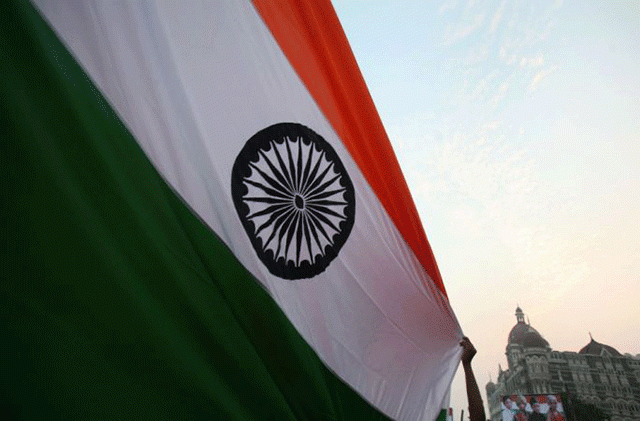India — like us, but not quite
Over two dozen scholars return their prestigious Sahitiya Akademi awards to protest intolerance against minorities

PHOTO: REUTERS
While the faintly aware among us always knew that the above caricature was not quite the reality in India, I find it amusing that the people who did believe in it are now furious that what they believed is actually becoming a reality! The rise of the Hindu right ever since the election of Prime Minister Narendra Modi is largely what the Pakistani narrative stated India was always like, so why the outrage? One person who spoke to me about this said, “We are outraged since India claims to be secular!” But did we ever take this claim of secularism seriously? If we did, then, by that logic, there would have been no point in creating Pakistan!
While the noted poet Fahmida Riaz has rightly lamented that India is turning out just like us, indications are that this is not completely the case. I cannot make a full argument here, but let me make a couple of points.
First, the Indian polity is based on a very diverse platform. Compared to Pakistan, where a mono-cultural identity has been imposed, India has thrived on a ‘unity in diversity’ slogan. Hence, while there are increasing attacks on minorities, and the awful killing of Mohammad Akhlaq is a testament to rising tensions, on the other side of the coin is the story of the crowd-funding of a Pakistani girl Saba Tariq Ahmed’s treatment in India. Saba, who was suffering from Wilson’s disease, was twice funded by Indian nationals, up to the tune of INR13 lakhs for her weeks-long treatment in India. This story alone shows that India is not just about one story, one monolithic people or one way of thinking and reacting. Furthermore, over two dozen scholars have returned their prestigious Sahitya Akademi awards in protest against the rising intolerance in India. The return of these awards has created a furore where a public discussion has already begun about the seriousness of the current situation. These examples, and more, show that there is already a reaction in India to the rise of intolerance and there is nothing to show that the extremists are going to win this battle.
Secondly, India is still developing and as societies become richer and more urbanised, societal fissures come to the fore. Since 1991, India has been on the fast-track of development: cities have grown, rural areas have shrunk and income, class and caste inequalities have increased. These factors have exacerbated religious tensions too. A lot of Hindutava supporters have come up economically and politically in the last couple of decades and they are just flexing their muscles. Just like caste politics, religious politics is and will remain fluid in India and therefore we must not take the recent turn of events as decisive.
Thirdly, democracy is the prime guarantor that events in India are not going to completely slide out of control. In Pakistan, we have a tendency to undermine the importance of the elected government, and its change after five years, because we know that elected governments do not make a real difference as decisions are mostly made elsewhere. However, this is not the case in India. While India has Modi as prime minister now, it also had Dr Manmohan Singh as prime minister for a decade, and in the next election things can change. The BJP came to power earlier as well and was then voted out despite being confident that its ‘Shining India’ slogan would lead it back to power. However, the reality turned out to be a rude shock. It might appear that India is becoming like us, but I would not hold my breath on this actually happening.
Published in The Express Tribune, October 17th, 2015.
Like Opinion & Editorial on Facebook, follow @ETOpEd on Twitter to receive all updates on all our daily pieces.















COMMENTS
Comments are moderated and generally will be posted if they are on-topic and not abusive.
For more information, please see our Comments FAQ